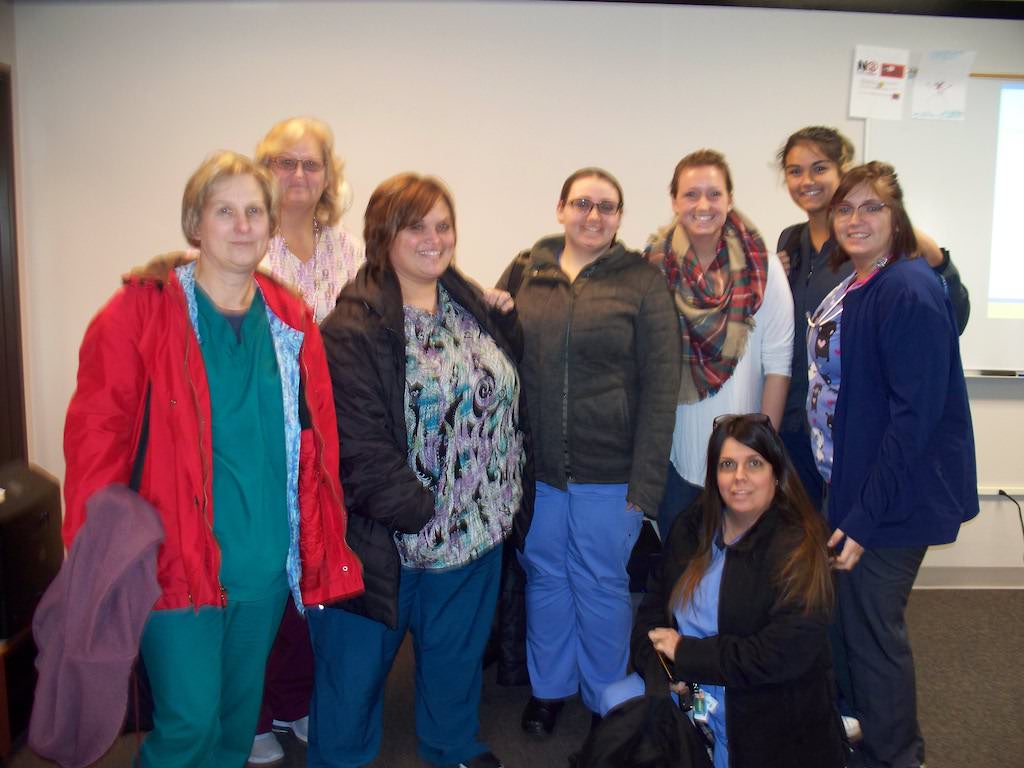 This December, staff and students at Ross Medical Education Center in Lansing, Michigan were pleased to host guest speaker Mackenzie Ganzak of Michigan Blood’s Be The Match Organization. Mackenzie spent an entire afternoon at the campus, offering three presentations to morning, afternoon, and evening students. During that time, she shared videos and a wealth of information on Be The Match, a national bone marrow program. The Ross Lansing students have proven over and again their eagerness to help others. So, with open hearts and open minds, they listened to Mackenzie’s presentations and learned how their willingness to be a donor could mean the difference between life and death for a complete stranger.
This December, staff and students at Ross Medical Education Center in Lansing, Michigan were pleased to host guest speaker Mackenzie Ganzak of Michigan Blood’s Be The Match Organization. Mackenzie spent an entire afternoon at the campus, offering three presentations to morning, afternoon, and evening students. During that time, she shared videos and a wealth of information on Be The Match, a national bone marrow program. The Ross Lansing students have proven over and again their eagerness to help others. So, with open hearts and open minds, they listened to Mackenzie’s presentations and learned how their willingness to be a donor could mean the difference between life and death for a complete stranger.
According to the Be The Match website, “every three minutes someone in the United States is diagnosed with a blood cancer like leukemia. For many, their only hope for a cure is a bone marrow transplant.” Many people are unaware there are two ways of donating. The first method, PBSC (peripheral blood stem cell) donation “is a non-surgical outpatient procedure called aphaeresis. The donor receives a drug for five days prior to donation that increases the number of cells in the bloodstream. The cells are then collected during donation. The donor may experience head or muscle aches that disappear shortly after donation, and are typically back to their normal routine in one to two days.” The second approach is marrow donation, which “is a surgical, outpatient procedure that takes place in a hospital operating room. While the donor is under anesthesia, doctors collect marrow from the back of their pelvic bone. After donation, donors may feel soreness in the lower back. Donors are typically back to their normal routine in two to seven days.”
There are several myths about donating bone marrow. A couple of those are that “donating is dangerous and weakens you.” The fact is, “risks are very small and long-term side effects are rare. Only 1% to 5% of your marrow is needed to save a life, so you’d stay strong. Your marrow replaces itself in four to six weeks.” Some people also believe that “pieces of the bone are removed from you during marrow donation.” However, “pieces of bone are never taken in marrow donation. Only the liquid marrow found inside the pelvic bone is needed to save the patient’s life.” One major issue that may stop many from donating is the myth that “it costs money to donate.” In reality, “donors never pay to donate, and are never paid to donate.” The organization “reimburses all travel costs and other costs as well.”
Nathan Worley, a student in the Medical Assistant program, shared his thoughts on the presentation: “My reason for registering to donate with Be The Match stems from a moving presentation we had in our Medical Assistant course at Ross Medical in Lansing, Michigan. It was an amazing presentation done by Mackenzie. Being educated on the increasing number of needed donors and the stories behind the successful and unsuccessful matches were very moving for me as I began to think about my baby boy due in March and how fortunate my family is to have a healthy baby boy on the way. I couldn’t stop thinking ‘Well what if that was my son that was diagnosed with leukemia and no one in my family was a fitting match?’ I honestly don’t know what I would do and that’s when it hit me hard. The only real chance at survival for these poor kids, adults, and their families is you and Be The Match. Being the voice that reaches out for these men, women and children is honorable and what better way to honor something so remarkable than to register as a donor and volunteer myself to help in any way that I can. Without McKenzie’s presentation at Ross Medical, a few of us in class would have never even known about the potential opportunity to save a life just by donating bone marrow. These people didn’t ask to be diagnosed with terminally ill diseases and if it was you or a loved one in their shoes you could only wish to find an acceptable donor. Have some heart, launch 2019 off with a good start and look into Be The Match so YOU can save a life.”
To learn how you can join this vital program, visit Join.BeTheMatch.org or call 1-800-627-7692. Ross students can go directly to Join.BeTheMatch.org/RossMedical. This could be the year that you save a life!
